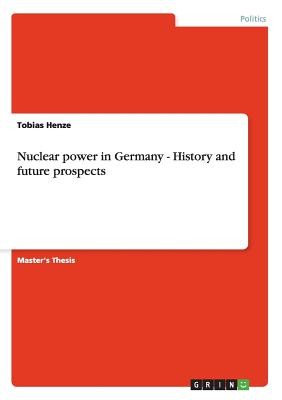
- We will send in 10–14 business days.
- Author: Tobias Henze
- Publisher: GRIN Verlag
- Year: 2013
- Pages: 88
- ISBN-10: 3656364958
- ISBN-13: 9783656364955
- Format: 14.8 x 21 x 0.5 cm, softcover
- Language: English
- SAVE -10% with code: EXTRA
Nuclear power in Germany - History and future prospects (e-book) (used book) | bookbook.eu
Reviews
Description
Master's Thesis from the year 2012 in the subject Politics - Miscellaneous, grade: sehr gut, language: English, abstract: The aim of this master thesis is to explain Germany's decision to phase out its nuclear power plants by 2022 and move from fossil fuels to renewable energy sources. As the decision to phase out is rather unique among the industrialized and most advanced nations, the paper is set out to analyze the reasons for the peculiarity and assumes that the long-lasting societal debate on the topic of nuclear technology has gradually influenced the decision-making process. The hypothesis is based on the observation that the decision to phase out had been taken shortly after the nuclear accident in the Japanese atomic power plant Fukushima which caused large-scale criticism against the previous energy policies of the government. The analysis uses a historical approach and applies an analytical framework which incorporates the most important stakeholders of the decision-making process. The analytical framework centers on Kingdon's multiple streams model and further takes into account theories and models explaining the working and behavior of politicians and parties, the media, the public and pressure groups which all have an impact on the policy-making process. Thereby, the paper is able to depict the development of the societal debate and to assess its impact on nuclear policy decisions of the past and present. Moreover, the paper elaborates on the question how Germany's decision to transform its energy production is put into practice. Here, a review of the policies establishing the energy transition is used in order to explain the most important provisions and problems that already have been encountered. Additionally, proposed policy changes are presented that might be implemented in the future in order to solve the problems.
EXTRA 10 % discount with code: EXTRA
The promotion ends in 15d.12:43:37
The discount code is valid when purchasing from 10 €. Discounts do not stack.
- Author: Tobias Henze
- Publisher: GRIN Verlag
- Year: 2013
- Pages: 88
- ISBN-10: 3656364958
- ISBN-13: 9783656364955
- Format: 14.8 x 21 x 0.5 cm, softcover
- Language: English English
Master's Thesis from the year 2012 in the subject Politics - Miscellaneous, grade: sehr gut, language: English, abstract: The aim of this master thesis is to explain Germany's decision to phase out its nuclear power plants by 2022 and move from fossil fuels to renewable energy sources. As the decision to phase out is rather unique among the industrialized and most advanced nations, the paper is set out to analyze the reasons for the peculiarity and assumes that the long-lasting societal debate on the topic of nuclear technology has gradually influenced the decision-making process. The hypothesis is based on the observation that the decision to phase out had been taken shortly after the nuclear accident in the Japanese atomic power plant Fukushima which caused large-scale criticism against the previous energy policies of the government. The analysis uses a historical approach and applies an analytical framework which incorporates the most important stakeholders of the decision-making process. The analytical framework centers on Kingdon's multiple streams model and further takes into account theories and models explaining the working and behavior of politicians and parties, the media, the public and pressure groups which all have an impact on the policy-making process. Thereby, the paper is able to depict the development of the societal debate and to assess its impact on nuclear policy decisions of the past and present. Moreover, the paper elaborates on the question how Germany's decision to transform its energy production is put into practice. Here, a review of the policies establishing the energy transition is used in order to explain the most important provisions and problems that already have been encountered. Additionally, proposed policy changes are presented that might be implemented in the future in order to solve the problems.


Reviews